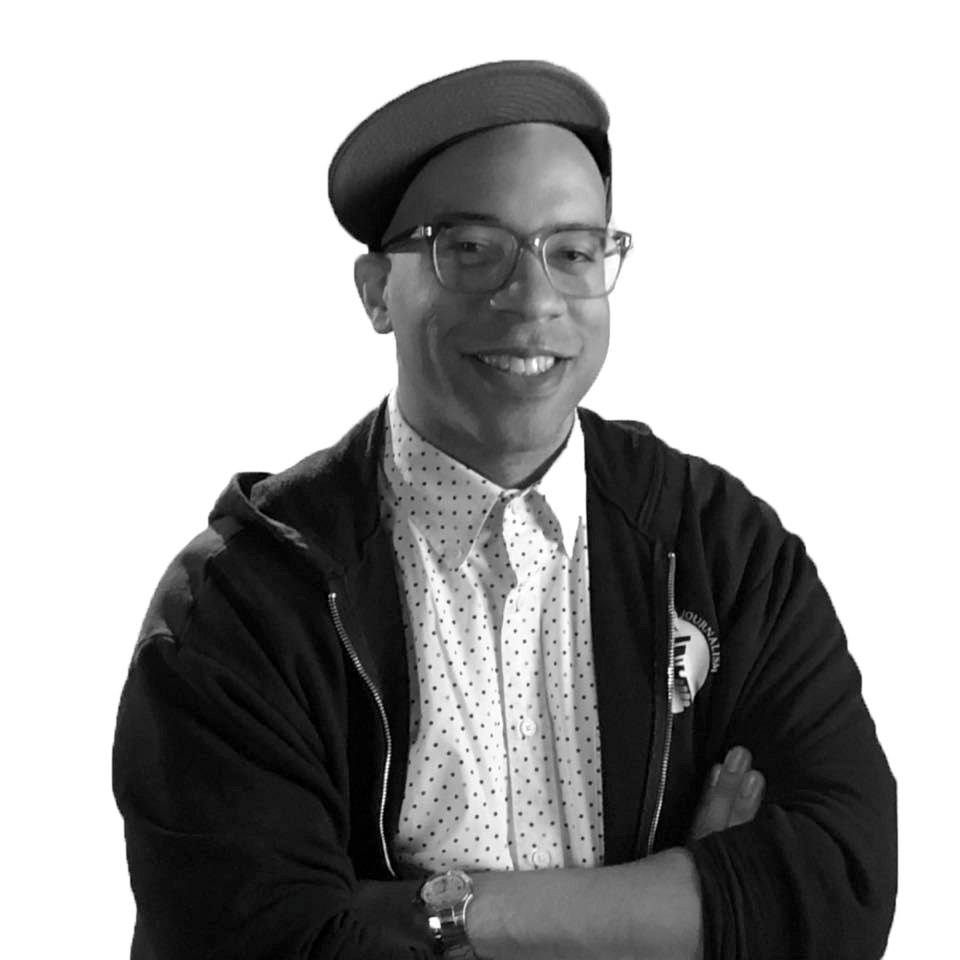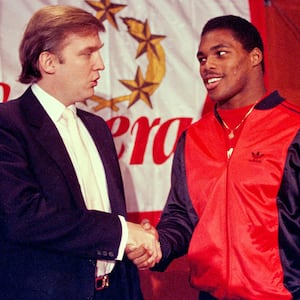The A$AP Rocky controversy has been yet another reminder that President Donald Trump has always had a convenient veneer to mask his clear and present racism: his apparent affinity for black celebrities.
In a particularly awkward scene at the White House last week, flanked by Buzz Aldrin and other NASA legends for what was supposed to be a commemoration of the Apollo 11 mission, Trump delivered a rambling answer to a question raised about the recent arrest and detainment of rapper A$AP Rocky for assault in Sweden.
Trump claimed that the White House was actively negotiating the rapper’s release, following the dissemination of conflicting videos which suggested that the 30-year-old was either defending himself or was the aggressor in a violent encounter while touring overseas.
ADVERTISEMENT
A$AP Rocky, born Rakim Athelaston Mayers, has maintained his innocence and his cause has been taken up by other stars in the hip-hop community, with some citing allegedly inhumane conditions in which the rapper has been jailed. A petition demanding his release has garnered hundreds of thousands of signatures, and eventually, a call reportedly placed by Kanye West, Trump’s most high-profile African-American supporter, to Jared Kushner put the drama on the president’s radar.
As Trump repeatedly invoked A$AP Rocky’s name, lingering on it as if he had never heard it before—which to be fair, as a 73-year-old man with no discernible interest in music, he shouldn’t have—he appears to have recognized an opportunity to demonstrate his supposed generosity towards the black community while distracting from policies that disportionately negatively affect them, like the reinstitution of the federal death penalty.
Or, as he did with black activist NFL players or loudmouthed NBA father LaVar Ball, the case could provide a chance to pillory a prominent black person for being ungrateful towards him—another Trump staple.
In public, and reportedly in private, Trump likes to speak in grim generalities about black people: they’re “living in hell;” they’re people he doesn’t want counting his money; and, since he was elected, they’re—according to the president—some of his biggest fans.
But Trump has always viewed black people with name recognition and status differently.
During those strange, rudderless transition days in late 2016, black household names like NFL legend Jim Brown, comedian Steve Harvey and two of his biggest cheerleaders, Don King and West, stood out among the luminaries granted an audience with the newly elected president.
All of these notable figures lost serious street cred within the black community by cozying up to Trump, but they also earned the president’s loyalty as all that flatter him do.
Still, it was striking, considering that fact that during the 2016 race, Trump had almost assiduously avoided interacting with voters of color (his ill-fated jaunt to Flint amid the water crisis only resulted in an embarrassing photo-op), choosing instead to lecture mostly white crowds about how bad black people were doing under President Obama.
And then suddenly he was all smiles next to a blonde and brooding West. For even his biggest critics on race matters, Trump’s open door policy for black stars was a confusing tendency to reconcile.
The truth is that he is the living breathing personification of John Turturro’s bigoted character in Do the Right Thing—who justifies liking black celebrities like Prince, Eddie Murphy and Magic Johnson, while remaining virulently racist, because they’re “more than black” to him.
In his ‘80s and ‘90s heyday, Trump shamelessly hewed close to some of the most iconic black figures in popular culture, albeit tarnished ones, like Mike Tyson and Michael Jackson.
And despite making the occasional offensive remark (he once said he’d rather be a “well educated black,” because he believed they got unfair preferential treatment) he’d even managed to curry favor with black political figures who also happened to be celebrities, like Rev. Jesse Jackson and Rev. Al Sharpton.
Later, on his Apprentice reality show and especially on its later Celebrity incarnations, Trump was all too happy to have the participation of well-known black stars like Arsenio Hall, Lil Jon and fellow Kim Jong Un fan, Dennis Rodman.
These ‘relationships,’ or the appearance thereof ,fulfilled many desires for Trump: they buttressed his image as a hip, celebrity-connected playboy; and they built up his bona fides with the black community, while deflecting any pesky criticism of his record on race.
For years, in hip-hop songs his name became synonymous with an inspirational form of take-no-prisoners greed, and it’s been well-documented that prior to his debut as a birther, Trump enjoyed high approval numbers among black Americans, who were among the most stalwart consumers of his shows.
As his oft-teased political career became a reality and Trump’s history of racism became more common knowledge (cable news hosts have taken to rote recitation of the infamous litany: from his ‘70s housing discrimination through “Send her Back”) it became even more necessary for him to wrap himself in the gauze of famous black friends.
For instance in June of 2016, Trump tweeted: “Don King, and so many other African Americans who know me well and endorsed me, would not have done so if they thought I was a racist!”
Only Donald Trump would imply that as Don King goes, so does the majority of the black community.
Once in the White House, in one of his few widely praised acts as president, Trump posthumously pardoned legendary black heavyweight boxer Jack Johnson (not failing to mention in the process that he was doing something Obama had not) and has repeatedly floated the idea of doing the same for the late, great Muhammad Ali for his crime of draft evasion—apparently unaware that the Supreme Court overturned the conviction in 1971. For his part, Trump has viewed these acts as transactional, and he has expected the fealty of black Americans in return.
Last fall, Americans were greeted with the spectacle of what the president’s brand of loyalty looks like when he allowed a clearly unhinged West to go on a prolonged, profanity-laden rant in the Oval Office on live TV simply because the rapper had recently decided to go full MAGA.
Many a late-night comic and pundit pointed out how uncomfortable Trump looked during this display, but he didn’t dare interrupt someone famous—whether they be black or white—paying him a compliment.
When a black star doesn’t flatter him, Trump won’t hesitate to call them racist without explanation or context. Bryant Gumbel, Spike Lee and writer Touré have all earned that distinction.
But for the most part, one could argue that Trump treats black celebrities much like he treats white people—his assessment of their talent and worth is a product of their opinion of him.
Case in point: LeBron James, who went from being a “great guy” in Trump’s estimation in 2013 to someone who needed to be made to “look smart" after the three-time NBA champion criticized his presidency in 2018.
Most recently, Trump has smeared four rising star Democratic congresswomen of color who have been highly critical of his agenda as “very racist.” Even if one takes exception to some of the statements they’ve made—and, it’s worth noting, many people don’t—it’s hard to construe anything they’ve said publicly as remotely racist.
Ironically, Trump has shown way more deference to A$AP Rocky, even offering to pay for his bail. The rapper, who has been formally charged with assault, could face up to two years in prison and at the time of this story’s publication still remains in Swedish custody.
Perhaps, Trump’s tune will change if he ever learns that the New York-based artist once referred to him as an “asshole” on a record. On the other hand, A$AP Rocky, who has been decidedly apolitical during his career, may be Trump’s kind of guy
Back in 2016, A$AP Rocky scoffed at the notion of being an ally to the Black Lives Matter movement during an interview with The Breakfast Club. “So every time something happens because I'm black I gotta stand up? What the fuck am I, Al Sharpton now? I'm A$AP Rocky. I did not sign up to be no political activist,” he said, adding."I don't wanna talk about no fucking Ferguson and shit because I don't live over there!” he went on.
“I live in fucking Soho and Beverly Hills. I can't relate.”
That kind of disaffected abstention is actually what Trump craves most from African-American voters of all stripes, no matter how much he claims to be their champion. As long as A$AP Rocky stays on the president’s good side, he may win the freedom he and his fans believe he deserves.






